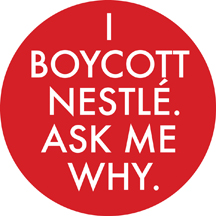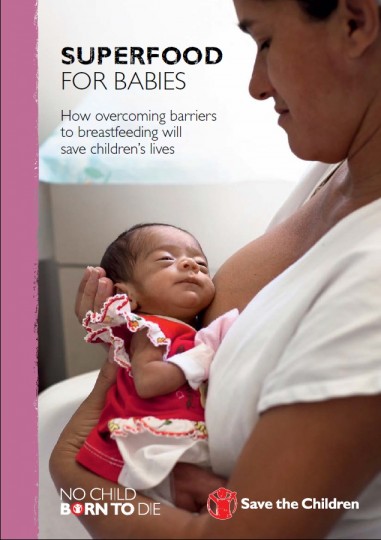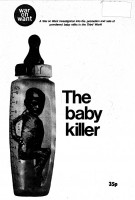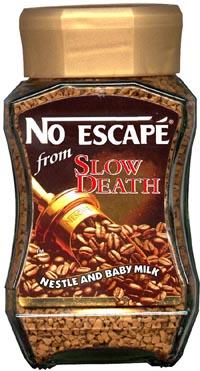
The breast milk of mothers has been described as the closest thing there is to a ‘silver bullet’ when trying to tackle malnutrition and reduce death rates among new-born babies. The World Health Organisation (WHO) recommends colostrum, the milk produced at the end of pregnancy, as the ideal food for a new-born baby as it provides vital nutrients and boosts immune systems; the organisation continues to promote exclusive breastfeeding of babies for the first six months wherever possible. WHO’s 10 facts on breastfeeding outlines the immediate and long-term benefits and the arguments against infant formula. Fact no. 5 states, for instance:
Why not infant formula?
Infant formula does not contain the antibodies found in breast milk. When infant formula is not properly prepared, there are some risks arising from the use of unsafe water and unsterilized equipment or the potential presence of bacteria in powdered formula. Malnutrition can result from over-diluting formula to “stretch” supplies. Further, frequent feedings maintain the breast milk supply. If formula is used but becomes unavailable, a return to breastfeeding may not be an option due to diminished breast milk production.
According to UN figures, 37% of children globally are exclusively breastfed for the first six months of life and 43% are breastfed within the first hour. The World Health Assembly, the decision-making body of the WHO, wants by 2025 at least half of under-six-month-olds to be exclusively breastfed. But two-thirds of the 92 million children who are not exclusively breastfed live in just 10 countries – India, China, Nigeria, Indonesia, Philippines, Ethiopia, Vietnam, Pakistan, Bangladesh and Democratic Republic of the Congo – seven of which have some of the highest child mortality rates in the world.
Non-Governmental organisation Save the Children estimates that more than 800,000 deaths could be prevented each year if infants were given breast milk in the first hour of life but, in a recent report Superfood for Babies the organisation argues that the marketing practices of infant formula manufacturers are continuing to contribute to a continuing decline in breastfeeding in nations with some of the highest child mortality rates.
that more than 800,000 deaths could be prevented each year if infants were given breast milk in the first hour of life but, in a recent report Superfood for Babies the organisation argues that the marketing practices of infant formula manufacturers are continuing to contribute to a continuing decline in breastfeeding in nations with some of the highest child mortality rates.
The baby food industry is estimated to be worth more than $36 billion (predicted to rise by an additional 31% by 2015) with the sale of milk formula accounting for $25 billion of this. Nestlé SA continues to be the global leader in baby food with 23% of the market, followed by Danone with 14% and Mead Johnson with 11%.
Origins of the campaign
Beginning in 1973/74, through the New Internationalist magazine and in a booklet entitled The Baby Killer (1974) published by War On Want, a major international campaign to challenge the behaviour of formula manufacturing companies was initiated.

The campaign has continued to this day with company practices being monitored by the International Baby Food Action Network (IBFAN), which consists of more than 200 groups in over 100 countries. The campaign led to the emergence of the world’s first international consumer interest code in 1981 (the International Code of Marketing of Breast-milk Substitutes); inspired a series of global consumer movements on pharmaceuticals and pesticides (Health Action International – and the Pesticide Action Network) and the Nestlé boycott – the longest and most extensive consumer boycott in history (see https://info.babymilkaction.org/nestlefree).
The campaign illustrated the pivotal importance of civil society in initiating action and in changing international standards and norms. In Ireland the campaign was led by Jerome Connolly, Declan O’Brien and Pauline Eccles of the Irish Commission for Justice and Peace (there is much work to be done on documenting the history of campaigns such as this one and others in Ireland, campaigns that illustrate the central role played by civil society in all its dimensions. This history would be quite different from that offered by many of the ‘official’ stories now beginning to emerge).
The Code is designed to regulate ‘inappropriate sales promotion’ of breast-milk substitutes, and instructs signatory governments to ensure the implementation of its aims through legislation; the Code is not legally binding unless it has been enshrined into national law but, the Code also states that companies should abide by it and regard themselves responsible for monitoring their marketing practices.
Deception and denial – the campaign continues
In November 2000 the European Parliament invited IBFAN, UNICEF, and Nestlé to present evidence to a Public Hearing before the Development and Cooperation Committee. Evidence was presented by the IBFAN group from Pakistan and UNICEF’s legal officer highlighted Nestlé’s failure to bring its policies into line with the World Health Assembly Resolutions. Nestlé declined the invitation to attend, claiming scheduling conflicts, although it sent a representative of the auditing company it had commissioned to produce a report on its Pakistan operation. Despite the ongoing criticism, Nestlé insists it upholds the Code and, on May 16th, 2007 stated:
‘Nestlé has absolutely no interest in trying to avoid its responsibility in complying with the WHO Code. We therefore also appreciate having immediate and detailed information about any perceived non-compliance with the WHO Code in order to investigate and to take prompt remedial action if found substantiated.’
Campaigning groups continue to reject Nestlé’s statements, insisting instead that the company continues to breach agreed rules and they continue to document evidence to this effect.

The latest Save the Children report argues that marketing campaigns continue to promote misleading claims about the nutritional benefits of formula that have no scientific basis and argues that marketing practices are a barrier to encouraging mothers to breastfeed. For example, the report cites a poll in Pakistan of 2,400 mothers of whom 11% said they had seen or read promotional literature while in hospitals or clinics and 1,200 health workers 20% of whom said they had received gifts from companies to encourage them to promote formula – both practices breach the international code.
Save the Children is calling on manufacturers to cover at least a third of their packaging with a health warning that formula is inferior to breast milk. It also wants governments to turn the code into law and ensure it is implemented and monitored.
The debate on infant formula is a very specific campaign but it is one that raises many general and important questions about the role of corporations in the world and their responsibilities; about the importance of civil society, public education and ‘public judgement’; about campaigning, boycotts and policy and also about our responsibilities in the ‘Developed World’.
The infant formula debate and campaign has much to teach us!
___________________________
To find out more on the current status of the campaign and what campaigners are asking you to do, see https://ibfan.org/ and https://info.babymilkaction.org/nestlefree
To see company responses from Nestlé, Danone and others to the criticisms from Save the Children, see this document.
